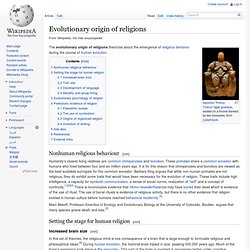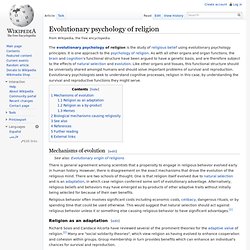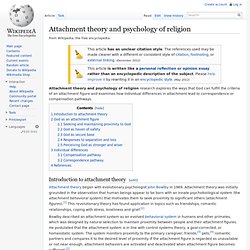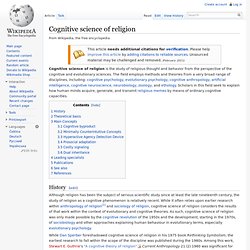

Evolutionary origin of religions. The evolutionary origin of religions theorizes about the emergence of religious behavior during the course of human evolution.

Nonhuman religious behaviour[edit] Humanity’s closest living relatives are common chimpanzees and bonobos. These primates share a common ancestor with humans who lived between four and six million years ago. It is for this reason that chimpanzees and bonobos are viewed as the best available surrogate for this common ancestor.
Barbara King argues that while non-human primates are not religious, they do exhibit some traits that would have been necessary for the evolution of religion. Marc Bekoff, Professor Emeritus of Ecology and Evolutionary Biology at the University of Colorado, Boulder, argues that many species grieve death and loss.[5] The God Delusion. The God Delusion is a 2006 best-selling[1] non-fiction book by English biologist Richard Dawkins, professorial fellow of New College, Oxford,[2][3] and former holder of the Charles Simonyi Chair for the Public Understanding of Science at the University of Oxford.

In The God Delusion, Dawkins contends that a supernatural creator almost certainly does not exist and that belief in a personal god qualifies as a delusion, which he defines as a persistent false belief held in the face of strong contradictory evidence. He is sympathetic to Robert Pirsig's statement in Lila (1991) that "when one person suffers from a delusion it is called insanity. When many people suffer from a delusion it is called religion. "[4] With many examples, he explains that one does not need religion to be moral and that the roots of religion and of morality can be explained in non-religious terms. The book has attracted widespread commentary, with many books written in response.
Scientism. Scientism is belief in the universal applicability of the scientific method and approach, and the view that empirical science constitutes the most authoritative worldview or most valuable part of human learning to the exclusion of other viewpoints.[1] It has been defined as "the view that the characteristic inductive methods of the natural sciences are the only source of genuine factual knowledge and, in particular, that they alone can yield true knowledge about man and society.

Scientism may refer to science applied "in excess". The term scientism can apply in either of two senses: To indicate the improper usage of science or scientific claims. This usage applies equally in contexts where science might not apply,[12] such as when the topic is perceived to be beyond the scope of scientific inquiry, and in contexts where there is insufficient empirical evidence to justify a scientific conclusion. Overview[edit] E. Relevance to science/religion debates[edit] Gregory R. Thomas M. Logical positivism. Evolutionary psychology of religion. The evolutionary psychology of religion is the study of religious belief using evolutionary psychology principles.

It is one approach to the psychology of religion. As with all other organs and organ functions, the brain and cognition's functional structure have been argued to have a genetic basis, and are therefore subject to the effects of natural selection and evolution. Like other organs and tissues, this functional structure should be universally shared amongst humans and should solve important problems of survival and reproduction. Evolutionary psychologists seek to understand cognitive processes, religion in this case, by understanding the survival and reproductive functions they might serve. Mechanisms of evolution[edit] There is general agreement among scientists that a propensity to engage in religious behavior evolved early in human history. The End of Faith. Positivism. Group selection. Group selection was used as a popular explanation for adaptations, especially by V.

C. Wynne-Edwards.[1][2] For several decades, however, critiques, particularly by George C. Williams,[3] John Maynard Smith[4] and C.M. Perrins (1964), historically cast serious doubt on group selection as a major mechanism of evolution. However, some scientists have pursued the idea over the last few decades, and group selection models have seen a resurgence since the mid-1990s with increasing popularity.[5][6][7][8] Agent detection. Evolutionary origins[edit] It is believed that humans evolved agent detection as a survival strategy.

Attachment theory and psychology of religion. Attachment theory and psychology of religion research explores the ways that God can fulfill the criteria of an attachment figure and examines how individual differences in attachment lead to correspondence or compensation pathways.

Introduction to attachment theory[edit] Attachment theory began with evolutionary psychologist John Bowlby in 1969. Attachment theory was initially grounded in the observation that human beings appear to be born with an innate psychobiological system (the attachment behavioral system) that motivates them to seek proximity to significant others (attachment figures).[1] This revolutionary theory has found application in topics such as friendships, romantic relationships, coping with stress, loneliness and grief.[2] Bowlby described an attachment system as an evolved behavioral system in humans and other primates, which was designed by natural selection to maintain proximity between people and their attachment figures.
Cognitive science of religion. Cognitive science of religion is the study of religious thought and behavior from the perspective of the cognitive and evolutionary sciences.

The field employs methods and theories from a very broad range of disciplines, including: cognitive psychology, evolutionary psychology, cognitive anthropology, artificial intelligence, cognitive neuroscience, neurobiology, zoology, and ethology. Scholars in this field seek to explain how human minds acquire, generate, and transmit religious memes by means of ordinary cognitive capacities.